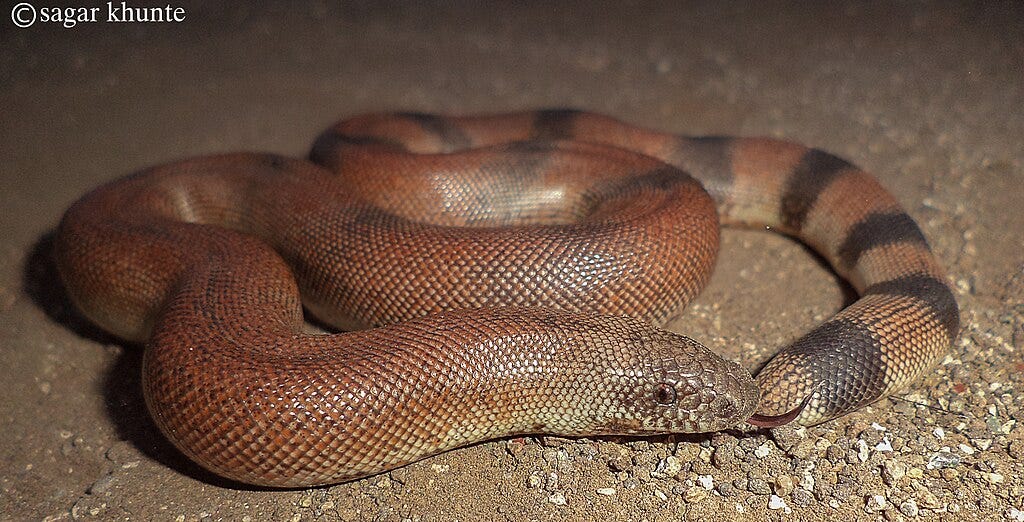Gorillas for sale, lizards in luggage and a trafficked flamingo
Wild Crime: updates from the week in the world of wildlife trafficking and environmental crime
Wildlife trafficking wouldn’t exist without consumer demand. There are a number of reasons people may wish to purchase wild animals. Some are popular as exotic pets in places like Europe and the US. Some people prize their body parts for use in traditional medicines.
But a report this week from Mongabay has highlighted another reason for the trafficking of one animal: superstition.
The red sand boa is subject to a “rampant” illegal trade fueled by myth and superstition. Some communities in India believe that they will lead you to hidden treasure or that keeping one in your house will mean you become rich, according to reptile expert Nirmal Kulkarni.
There were 172 media reports of illegal red sand boa trades in India between 2016 and 2021, according to a report published by Kulkarni.
Mongabay has made a short documentary on the issue. You can watch it here.
Spain: Crocodiles, marmoset monkeys and a flamingo were among the wild animals seized in an anti-trafficking operation in southern Spain. Police also found tortoise shells, zebra skins and caracal fur during the raid in Malaga. Investigators are looking into 24 wildlife crimes relating to 26 people, some of whom are alleged to have been using unregistered boats and have previous bans relating to similar offences. (Murcia Today)
Nigeria: Buyers can purchase as many as 100 ape heads at markets in northern Nigeria, an investigation by environmental outlet Mongabay has discovered. The illegal trade in gorilla and chimpanzee body parts operates over a wider area than previously believed, the report found. A trader made the claim about the number of heads available to a Mongabay journalist. (Mongabay)
DRC: The capture and trade of African gray parrots has been banned in the province of Tshopo in the Democratic Republic of Congo, a key transit area for traffickers. Gray parrots are among the most-trafficked birds in the world and the decision will be an important barrier to their illegal trade. The ban also applies to red-fronted parrots, another popular bird. (Mongabay)
Türkiye: A baby monkey found abandoned in a parcel in the bus terminal of the Turkish capital has been successfully released into the city’s zoo, authorities have said. The monkey, who has been named Peanut, was found on boxing day last year and was quarantined before joining a new family in the park. (Daily Sabah)
India: There has been an increase in illegal wildlife trades disguised as “zoo transfers”, according to an international NGO. The report in India does not name the NGO, but Wild Crime is aware of numerous tricks that traffickers can use to attempt to get round customs. Animals can be classified as “gifts” for private zoos or there are examples of wild animals being issued with false paperwork that wrongly classifies them as captive bred (and therefore legal to trade). We will be looking into this issue further. (The Wire)
EU: Online platforms will be legally bound to prioritise materials identified as illegal by the International Fund for Animal Welfare, after it was appointed as a “trusted flagger” in the EU. Organisations given the status are able to flag concerning posts to platforms, which are then required to respond. The online trade has become a significant driver of demand for wild animals, with criminals using social media platforms to advertise their wares. (IFAW)
India: An international wildlife smuggling gang was apparently busted after routine luggage checks discovered snakes, lizards and chameleons hidden in false suitcase compartments. Temporary housing was found for the animals, while the individuals involved were detained and travel documents impounded. (Pragativadi)
Nigeria: A suspected high-level Chinese wildlife trafficker has been arrested by Nigerian Customs in Lagos. The arrest follows a warehouse raid last year during which officers found pangolin scales hidden among 230 packets of frozen beef. In total, more than seven tonnes of scales were seized. (Environews)
USA: A man has been charged with animal cruelty after 96 dead animals were found at his rented home. Law enforcement officers in Massachusetts found the bodies of chickens, ducks, geese, pigs and rabbits. He could face a five year ban from owning an animal. (WWLP)
Kashmir: Police have acted against an organised gang smuggling timber in the Kashmir Valley. The group is alleged to have been illegally felling willow trees on government land and then transferring it for illegal sale elsewhere. Officers intercepted a vehicle carrying 25 stolen timber logs. (Kashmir Reader)
UK: Drones and thermal imaging cameras were deployed to crack down on illegal fishing in Suffolk, UK, following reports by the Angling Trust. Angling for some species is illegal between March and June in the UK, while some anglers also fish in private lakes. Fishing without a licence can lead to a £2,500 fine. (East Anglian Daily Times)
USA: Social media videos proved the downfall of another animal offender. Authorities took some dogs into custody in the USA after videos were posted appearing to show their owners hitting them. The pug was otherwise cared for, with food, water and shelter, according to police, and was not badly injured. (East Bay Times)


